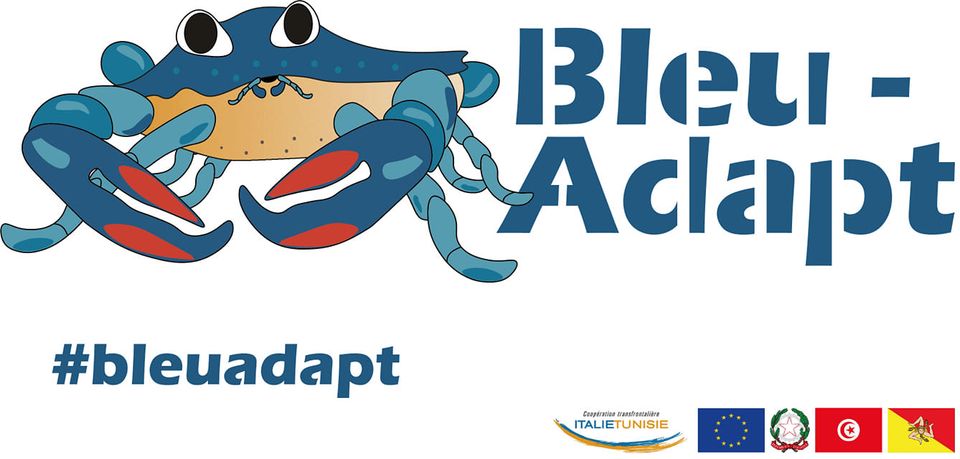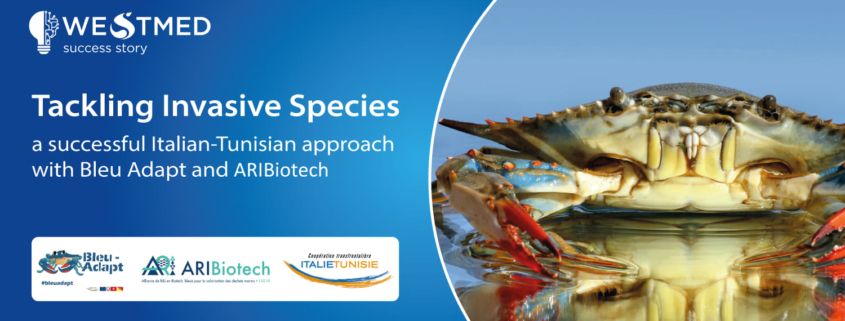WestMED Success Story. Tackling invasive species: a successful Italian-Tunisian approach with Bleu Adapt and ARIBiotech
Tackling invasive species is one of the main lines of action by the European Commission (EC) on protection of marine ecosystems and its biodiversity, and it and is especially applicable to the Mediterranean Basin.
The introduction of these organisms into ports, coastal areas, and watersheds is damaging aquatic ecosystems worldwide, with estimated direct costs in the millions of dollars.
Invasive species are primarily spread by human activities. Maritime traffic is considered one of the main causes. Ships can carry aquatic organisms in their ballast water and biofouling on vessel hulls.
Invasive species can easily move between different geographic areas, especially in regions like the Mediterranean region with significant maritime connections.
EU policies
At European level, several regulatory frameworks tackle the challenge of invasive species.
The Marine Strategy Framework Directive (MSFD) is the primary European tool for maintaining clean, healthy, productive, and resilient marine ecosystems. The Directive requires Member States to develop national marine strategies to achieve or maintain a “good environmental status” and more sustainable use of marine resources. The Descriptor 2 of the MSFD address non-indigenous species, which expand their typical geographical distribution and become ‘invasive’ when they can threaten marine biodiversity.
The EU Biodiversity Strategy for 2030 and the Regulation (EU) No 1143/2014 on Invasive Alien Species identifies invasive alien species as one of the five main direct factors in biodiversity loss. All of these regulatory frameworks directly contribute to the European Commission’s Green Deal Strategy.
More than 1000 non-indigenous species have been identified in the Mediterranean and the Black Sea. Over half have established permanent populations and are spreading, causing concern about the threat they pose to marine ecosystems and local fishing communities.
Cross-border cooperation
Species move without any geographical limitation and thus, a national or local approach is often insufficient to counter these threats across the Mediterranean. Instead, a transnational, more regional approach is recommended to fight a coommon threat. Primarily because:
- Implementing measures at regional level are more cost-effective. Economies of scale allow for sharing resources and costs among multiple ports and regional actors.
- Sharing knowledge and experiences facilitates the mutual learning.
- Coordinating strategies and policies lead to better management with comprehensive approaches
Italy-Tunisia cooperation
An example of such a transnational cooperation is the Interreg NEXT Italy-Tunisia funding programme.
This programme spans the territories located on both sides of the maritime route connecting Sicily and Tunisia
The general objective is to exploit the unused growth potential of the territories involved, to achieve an economic, environmental and social rebalancing of the cooperation area, supported by inclusive growth, sustainable development and good governance.
This €36 Million programme has enabled multiple blue projects. Two notable projects that address invasive species are Bleu Adapt and Aribiotech

BLEU ADAPT: Fighting the “blue crab” invasion in the Mediterranean
The blue crab is an invasive species introduced into the Mediterranean through the Suez Canal.
The crab threatens the artisanal fishing along the Tunisian and Sicilian coastline. It damages the nets, eats all the other fish, has few predators and reproduces quickly.
Initiatives have been undertaken in this region to support the fishing community to adapt by learning how to make use of the situation through acknowledging the economic and nutritional value of the blue crab and changing the ways of fishing and commercialisation
‘BLEU-ADAPT – Marine biological invasion and fisheries: study, mitigation of damage and adaptation in the context of climate change’, is a comprehensive EU-funded project that was set up in 2019 and implemented by Tunisia’s Ministry of Agriculture.
The aim of BLEU ADAPT was to provide a rapid response to the blue crab invasion and develop a common strategy to cope with this new problem. Given the commercial potential of the blue crab, project partners have been conducting a series of studies (mapping and risk analysis) and pilot actions – like training and coaching artisanal fisherfolk and organising a blue crab festival – to introduce and promote the blue crab in local and international markets.
Next to the great nutritional and culinary value, the shell powder offers many valuable applications from a biotechological point of view, for animal feeds, cosmetics, nutraceutics and industrial use.
Bleu Adapt has considerably built and consolidated the Tunisian supply chain and transformed a huge environmental challenge into an opportunity of economic development.
Today the country has more than 50 companies processing and transforming the blue crab, including its shell, and a fast growing industry with its main export markets in Indonesia (38%), South-Korea (26%) and Vietnam (18%).
Other regions in Italy have shown interest to understand the dynamics of such a «joint partnership» approach like the one used with Bleu-Adapt as a way to properly respond to this emergency along its 8000 km coastline.
Rafik Nouaili, project coordinator of Bleu-Adapt
“The BLEU-ADAPT project had certain social and environmental impacts and also contributed to improving the economic situation of small fishermen and their families. The blue crab was previously considered a harmful species and has become a boon for many Tunisian fishermen, particularly on the island of Kerkennah. Its protection is essential! The key factors in the success of the BLEU-ADAPT project and the national strategy aimed at encouraging fishing, marketing and valorization of blue crab deserve to be explored and shared with all Mediterranean countries.”
This project also underscores the significant benefits that ENI CT Italie-Tunisie (now INTERREG NEXT Italie-Tunisie) transmits as an example to Mediterranean policies as a whole, for a resilient and sustainable Blue Economy.
Bleu Adapt was winner of the 2023 WestMED award in the category ‘Biodiversity, Marine Habitat Conservation and Response to Marine Pollution.’ You can watch their project pitch here
| More info about Bleu Adapt | |
| Budget | Total: €1.136.660 | EU contribution: €1,022,994 (INTERREG IT-TN) |
| Partners | Directorate-General for Fisheries and Aquaculture Tunisia (Tunisia)
University of Palermo – UNIPA (Italy) Distretto della Pesca e Crescita Blu – COSVAP (Italy) Higher Institute of Fisheries and Aquaculture of Bizerte (Tunisia) National Agronomic Institute of Tunisia – ISP(Tunisia) |
| Follow | Website |
| Duration | 31 December 2019 – 31 October 2023 |

ARIBiotech is another project dealing with invasive species and co-financed by the European Union under the ENI CT Italy-Tunisia Programme
ARIBiotech is an Alliance for Research and Innovation in Blue Biotechnology that focuses on the valorization of marine waste. It operates at the intersection of research, innovation, and entrepreneurship, with a specific emphasis on marine biotechnology.
Fishing ports are vital components of the regional economies, serving as active hubs that support the fishing industry, facilitate seafood distribution, and boost local economies. However, these dynamic environments are not without their challenges, as various forms of waste accumulate due to fishing and processing activities. This waste includes offcuts from fish processing, packaging materials, plastic debris, and dredged sediments.
Recognizing the pressing need for waste management and sustainable practices in marine ecosystems, the project addresses these issues head-on. It aims to explore innovative solutions for treating and utilizing marine waste, particularly focusing on the blue crab, to mitigate environmental impacts and promote sustainability in the fishing industry.
The port of Sfax, which faces significant pollution from blue crab waste, was selected as a focal point for action. Here, a startup called ‘Flavor for Med Fish’ has been established to produce hydrolysate and chitin extracted from blue crab waste. These products find applications in various sectors, including aquaculture feed, highlighting the potential for transforming waste into valuable resources and fostering sustainable practices in fishing port communities.
As part of this process they created a cross-border alliance for the exchange of knowledge and skills through internships and study visists.
ARIBIOTECH has allowed its partners to develop a network of laboratories which develop products from waste and by-produces, enriching the already consistent ecosystem of companies engaged in transformation, valorization in Tunisia and Sicily.
This network whose legal status is being defined (as a consortium or similar in the next months) is therefore to undertake common actions towards valorization and diversification, from traditional use of these produces and their derivates.
Considering the historical and robust interaction between Sicilian and Tunisian fishery ecosystems, this contributes to let these become closer and closer towards a unique joint ecosystem.
Saloua Sadok, 2021 WestMED award winner with Biovecq, and Aribiotech project leader:
“We are committed to advancing marine science and technology through innovative research. Our focus on blue biotechnology and aquatic bio-products aims to create sustainable solutions for waste valorization in Tunisian-Sicilian fishing ports. By synergizing research and entrepreneurship, we strive to address environmental challenges and promote economic growth.”
| More info about ARIBiotech | |
| Budget | Total: €1,424,058EU contribution: €1,281,652 (INTERREG IT-TN) |
| Partners | Institut National des Sciences et Technologies de la Mer – INSTM (Tunisia)
Istituto Zooprofilattico Sperimentale della Sicilia (Italy) Agence des Ports et des Installations de Pêche (Tunisia) Istituto per lo studio degli impatti antropici e sostenibilità in ambiente marino- Consiglio Nazionale delle Ricerche – CNR-IAS (Italy) Biotechpôle Sidi Thabet (Tunisia) Direction Générale de la Recherche Scientifique – DGRS (Tunisia) Consorzio Universitario della Provincia di Trapani (Italy) Région sicilienne – Dipartimento della Pesca Regione Siciliana (Italy) |
| Follow | Website |
| Duration | 7 June 2022 – 31 December 2023 |
Further reading:
Preview of BLEU-ADAPT scienfific publication on ScienceDirect: Invasive blue crabs and small-scale fisheries in the Mediterranean sea: Local ecological knowledge, impacts and future management
FAO article: From invasive species to prized export
GFCM article: Research programme on blue crabs
Mongabay article: Love ‘em and loathe ‘em: Mediterranean grapples with tasty, voracious invasive crabs
Preview of ARIBiotech scientific publications on ScienceDirect: https://link.springer.com/article/10.1007/s11356-021-18398-y | https://www.sciencedirect.com/science/article/abs/pii/S0889157524002035?via%3Dihub


